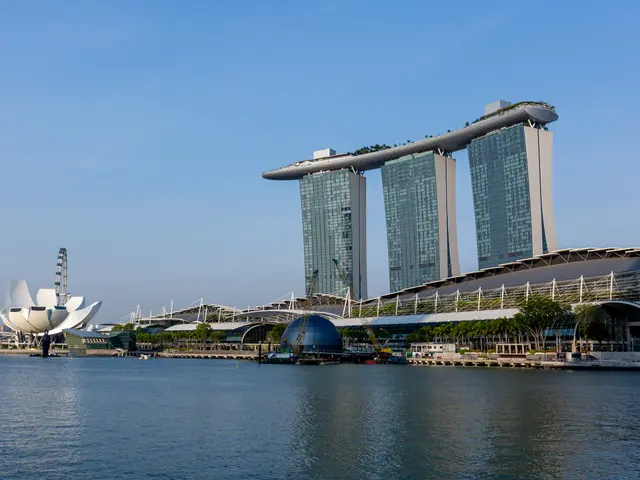Ha Long Bay boat tragedy: 34 fatalities due to inclement weather and potential environmental hazards highlighted
Ha Long Bay Disaster: A Maritime Accident Precipitated by Severe Weather
In July 2025, a tragic incident occurred in Ha Long Bay, Vietnam, when a tourist boat named "Wonder Sea (QN 7105)" capsized, resulting in 34 confirmed fatalities, 8 missing passengers, and numerous injuries. The disaster was primarily caused by a sudden severe local storm, specifically an abrupt thunderstorm with high winds, heavy rain, and hailstones.
Meteorological officials clarified that the thunderstorm was not related to Tropical Storm Wipha, indicating this was a sudden local extreme weather event rather than a larger storm system linked to climate phenomena. This suggests that the capsizing was a consequence of a severe but localized meteorological event rather than a disaster triggered directly by long-term climate change effects.
However, the disaster may have indirect links to climate change. Climate projections predict continued sea-level rise and increased rainfall intensity for Vietnam, making maritime travel riskier without intervention. Warmer seas, as evidenced by a rise in the surface temperatures of the South China Sea, are energizing tropical systems and intensifying storms and rainfall.
On the day of the tragedy, the Quang Ninh meteorological station issued thunderstorm bulletins at 11:45 and 13:30, but enforcement of "return-to-port" advisories remains weak. Enhanced Safety Protocols for vessels in Ha Long Bay should include real-time weather monitoring and immediate storm alerts. Smaller operators in Ha Long Bay often lack Doppler radar access or rely on phone apps with a 30-60 min delay, a critical window in convective evolution.
The disaster also highlights potential systemic issues in the maritime regulations and preparedness for such unpredictable weather in Ha Long Bay and similar coastal tourist hotspots. Current safety standards for passenger boats, designed for calmer inland waters, may be inadequate for the sudden, intense conditions sometimes experienced offshore. Experts argue that stricter safety requirements, better real-time weather monitoring and warnings, training for rapid emergency evacuation, and a ban on sailing during hazardous weather are needed to prevent such disasters.
While the direct triggering event was the sudden storm, environmental degradation does not appear to have played a significant role in this incident. However, Ha Long Bay, a UNESCO World Heritage Site, has experienced substantial ecological stress due to increased tourism, resulting in significant pollution and habitat disruption. Coral reefs in Ha Long Bay, crucial for natural wave attenuation, have severely degraded from approximately 234 species to 120 due to pollution and bleaching.
In summary, the Ha Long Bay disaster was an acute maritime accident precipitated by an unexpected and severe thunderstorm, with systemic maritime safety gaps playing a significant background role. While climate change may indirectly contribute to the rising unpredictability and intensity of localized storms affecting places like Ha Long Bay over the longer term, no direct attribution for this 2025 incident has been made. Improved meteorological monitoring, stricter safety regulations, and better emergency preparedness are crucial to prevent such tragedies in the future.
- In light of continuing climate change projections, it would be beneficial for companies to integrate Environmental, Social, and Governance (ESG) reporting into their operations, focusing on sustainability courses and events to promote climate-change awareness and mitigation strategies.
- As the science of climate-change and environmental science advances, it is essential to incorporate these findings into lifestyle choices, such as promoting eco-friendly travel options to reduce carbon footprint, preserve natural resources, and protect endangered ecosystems like Ha Long Bay.
- In the Aftermath of the Ha Long Bay disaster, meteorological experts have emphasized the importance of environmental reporting and analysis in predicting severe weather events like thunderstorms, which can help vessels enforce stricter Safety Protocols, including immediate storm alerts and real-time weather monitoring.
- Governments and tourism industries could collaborate on developing initiatives that promote the sustainability of coastal tourist hotspots, such as Ha Long Bay, by ensuring adherence to environmental regulations, reducing pollution, and implementing ecological restoration projects.
- To prevent future disasters like the one in Ha Long Bay, policymakers should prioritize the development and implementation of comprehensive maritime safety courses for vessel operators, providing them with up-to-date information on climate-change effects and enhancing preparedness for dangerous weather conditions.




